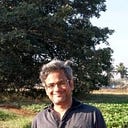Walk when you walk.
Your attention is who you are right now.
If you are scattered on many things, that means, your attention is divided across many.
Suppose you are busy working and someone interrupts you to tell something and you momentarily pick those and respond, that moment your attention has shifted out of what you are doing into that new thing.
This means you lost the context of the job you were doing and you have to switch to a new context for the new job. And when you switch back to what you were doing, it is almost like a new job for which you need to understand the context again.
Multi-tasking is hard for the brain. It keeps erasing the context as you switch and hence it is hard for you to remember anything what you do. This is not just true for knowledge work, but also for physical activities.
If you go for a walk and you talk on the phone, you lost all your attention on your walk. You may ask what is there to be attentive about the walk?
It is true that walking is mundane and there is nothing interesting to observe in it and so you decided to talk to someone.
But think about it. Had you been attentive to your walk as if it is the most interesting activity that is happening to you at that moment, not even getting lost in thoughts, but fully attentive to the walk, then you will see everything about your walk.
Whether you are walking fast or slow, equal paced or arbitrary, your heart beat, whether you are panting for breath or not, how easy your legs are able to carry your body, the air flowing in and out of you, the way your body is feeling the temperature of the outside air and a lot more.
Imagine a simple thing you took for granted like walking has so much to observe which you are delegating to an App to collect data and observe later instead of sharpening your own observation to see while it is happening.
The issue with multi-tasking is not only about being unable to observe what you are doing, but it also kills your ability to observe anything over a period of time. You become a sleep walker.
You may think you can look at the data from your walk post the walk and try to make sense. But the fact that you cannot keep your attention on one thing means you cannot as well be attentive to that post-mortem data.
Looking at things after it has happened is like analyzing a dead body. No matter how much data is there about your walk, it will never equal your attention you could have paid while you walked.
There is so much happening live which you fail to observe when you walk that cannot be captured by any App. In addition you also blunt your senses to observe something happening in front of your eyes.
As we become less and less attentive to the present, we become more reliant on technology and gadgets to come to our rescue, which are nothing but more dead memory for you. You go on increasing your cognitive workload making it appear as if you have a lot of things to do.
Your to do list keeps growing and it keeps you always unsatisfied, being unable to complete your work. Then you go for a Tasks App to keep track of things to complete without realizing that the root cause of your problem was ignoring your observation of what you are doing, while you are doing it.
At some point, this spirals out of control. Then you begin to read a lot of unwanted books or speeches on the Web that talk about how you can stay in the present moment making you wander into a self created world of confused terms and jargons like ‘mindfulness’ and ‘meditation’ and ‘self-awareness’ etc.
All because you did not walk when you walked.
